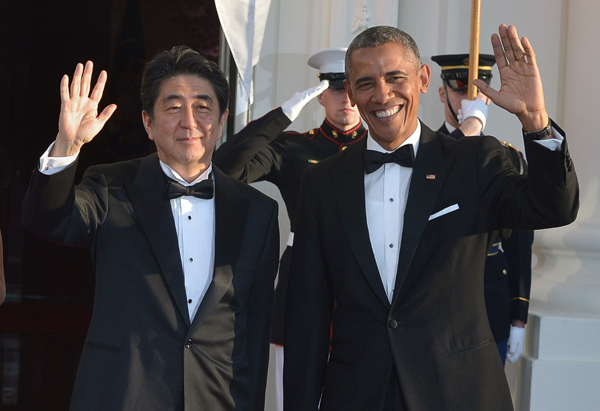U.S. President Barack Obama and Japanese Prime Minister Shinzo Abe agreed Tuesday to work together for an early conclusion of negotiations to forge a massive Asia-Pacific free trade deal.
The two leaders made the commitment during a news conference after summit talks, saying the sides have made “significant progress” in negotiations to conclude the Trans-Pacific Partnership.
“We reviewed the progress our teams have made towards the Trans-Pacific Partnership. I know that the politics around trade can be hard in both our countries, but I know that Prime Minister Abe, like me, is deeply committed to getting this done. And I’m confident we will,” Obama said.
 |
| U.S. President Barack Obama and Japan’s Prime Minister Shinzo Abe wave while posing upon arrival at the North Portico of the White House on April 28, 2015 in Washington, DC. (Yonhap) |
Abe also said that the two countries will continue to cooperate to “lead the TPP talks to its last phase.”
“We’ve confirmed that we would work together for the early and successful conclusion of the talks,” he said.
The TPP, if concluded, would mark an unmistakable achievement as Obama struggles to leave a legacy before his second term ends in two years.
Tuesday’s summit represented a demonstration of the ever-tightening alliance between the two countries, with both sides hailing strides in their economic and security partnerships and promising to work closely together to expand cooperation.
The U.S. and Japan have increasingly drawn closer in recent years as Japan has helped address American security and economic needs in a region marked by China’s rise.
In a display of such closeness, the U.S. has gone to great lengths to welcome Abe, allowing him to address a joint session of Congress, a big reward for the nationalist leader and a first for a Japanese prime minister.
In a joint vision statement, the two countries also hailed progress in TPP negotiations as well as the revision of their defense cooperation pact that calls for Japan to take on greater military roles. They also pledged to work closely together to tackle global challenges, saying their fates are “intertwined” and “inseparable.”
The U.S. also reiterated its support for Japan to become a permanent member of the U.N. Security Council.
“I want to reiterate that our treaty commitment to Japan’s security is absolute and that Article V covers all territories under Japan’s administration, including Senkaku Islands,” Obama said, referring to a set of islands at the center of a territorial dispute with China.
“We share a concern about China’s land reclamation and construction activities in the South China Sea, and the United States and Japan are united in our commitment to freedom of navigation, respect for international law and the peaceful resolution of disputes, without coercion,” he said.
The Obama-Abe summit was also watched closely as to whether and how they will discuss history tensions between South Korea and Japan. Obama has worked hard to help improve relations between the two allies, brokering a three-way summit with Abe and South Korean President Park Geun-hye last year.
It was unclear if history issues came up during the talks, but Abe refused again to offer a clear apology.
“I am deeply pained to think about the comfort women who experienced immeasurable pain and suffering as a result of victimization due to human trafficking,” Abe said during joint news conference with Obama, using a euphemistic term for sex slaves.
“This is a feeling that I share equally with my predecessors,” he said in response to a question whether he is willing to use the press conference as a chance to apologize for the sexual slavery issue. It was the first question to Abe during the conference.
Abe said his cabinet upholds the 1993 Kono Statement, in which Japan apologized for the atrocity, and has no intention of revising the statement. But he also said “women’s dignity and basic human rights have often been infringed upon during wars” throughout the 20th century.
The remark could be seen as meaning that Japan is not the only violator of women’s rights.
Relations between Seoul and Tokyo have been badly strained for years, due mainly to Tokyo’s attempts to whitewash its wartime atrocities and colonial occupation, especially its sexual enslavement of Korean women for its troops during World War II.
Frayed relations between the two allies have been a key cause for concern for the U.S. as it seeks to bolster three-way security cooperation seen as a key pillar for Obama’s “pivot to Asia” initiative aimed in part at curbing China’s rise. (Yonhap)

